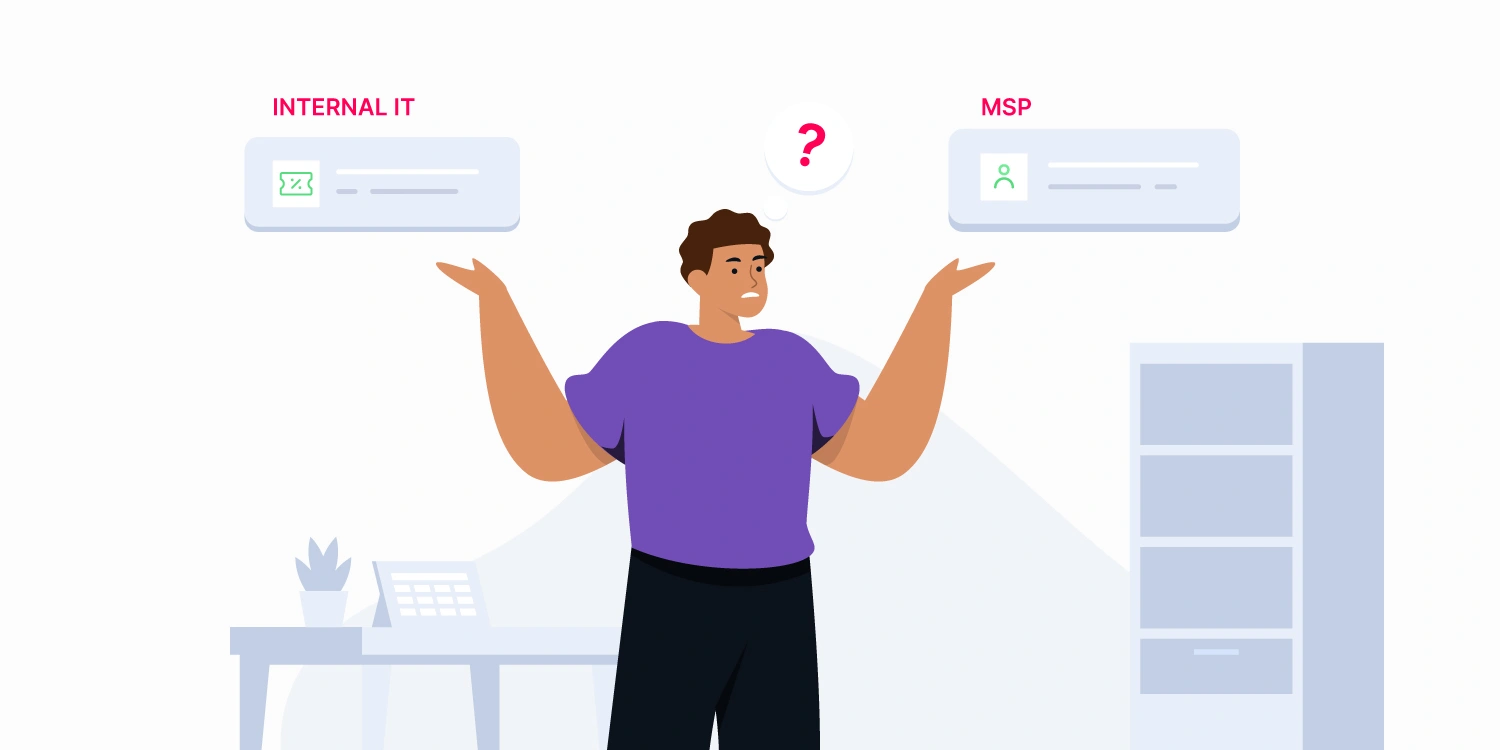Sometimes you consider which road to take - internal IT or MSP. But IT is IT. How does it matter? There are subtle differences between the two. So which one is better? Let's discuss this.
If you've started working in IT, you're either working for an in-house IT team or a managed service provider (MSP). You're wondering (read as: confused) if you should make a switch to the other side. what they're doing (even if they look like it). Career choices aren’t easy. They’re also not obvious. You never know if you’re making the right choice, only time can tell.
Right out of college, I chose IT because it was the only option available to me. In retrospect, I’m glad I didn't have many career options because IT was the best thing that’s happened to me. From working in IT, I moved to consult for IT and now building software for IT and managed service providers.
If you're reading this article, there’s a good chance you've picked a career in IT (excellent choice, by the way) and you're trying to decide between an internal IT team or an MSP. I won’t argue that one choice is better than the other. I will only highlight key differences in major aspects of the job that will help you make a choice.
Customers
Internal IT
Customers? What customers would an internal IT have to deal with, you ask? Well, you have ‘customers’ most of whom are actually your colleagues and you provide IT service to them The relationship is usually informal, given that you're not directly being paid by them to take care of IT. Both of you work for the same company, most likely in the same office, and the same company pays you both.
You'd meet your ‘customers’ in the cafeteria and share a joke near the water-cooler (or in the Slack channel, now that most of us are working remotely). This also means that you're more likely to be pulled aside for a quick ‘can-you-take-a-quick-look at this issue?’ when all you were doing was getting yourself some coffee. You cannot expect a ticket or email for every issue as the process or structure is not strictly enforced.
While things are usually casual, you'll have to think about more than just the ticket here. There will be power centers in your company and even if you don't want any part of it, office politics will catch up with you. Where the ticket comes from matters a lot more than the priority sticker. So, you’ll find yourself shuffling between multiple issues more often than not.
MSP
Here, things are more professional and that's not necessarily a bad thing. You'll be working with users across different companies. You'll majorly be interfacing with them through a ticket. That keeps things organized because every interaction needs to be captured.
In an MSP, you will not have to worry about anything apart from the ticket. The physical separation from the client (unless you're stuck onsite) will shield you from anything unnecessary going on over there.
Related reading: How MSPs can deliver better customer experience
Technology
The basics remain the same. Computers are still computers and these machines cannot differentiate between an internal IT and an MSP setup. But, how you interact with technology differs.
Internal IT
Few months into the job, you could know the entire technology stack like the back of your hand. It becomes very easy to zero-in on issues as they happen. You can become an in-house expert because of your knowledge and become an indispensable asset to the company.
If you haven't bothered to document your solidarity knowledge of how email servers work, that makes you invaluable. Whether that's actually good for the company (or yourself) is a different question altogether.
MSP
As you'll be working with many clients, you'll find yourself across different environments. You'll constantly challenge your muscle memory by context switching whenever an issue comes up. You're simultaneously learning how different companies set up their IT infrastructure.
You could be working with 5 clients with very different environments (2 on Microsoft, 1 on Google, and 2 on Linux). Working with them upgrades your skill in all environments, a luxury that would've taken much longer in internal IT.
Pro tip: Be it internal IT or an MSP, you must always be on the lookout to adopt new technology and not wait until it becomes the norm.
Process
Internal IT
The process for managing internal IT is a reflection of the company's overall vision.
A financial services company will have a strong data security process. A tech startup might keep it simple to make it easy for the employees. As a member of the IT team, you will have a strong say in how this process evolves. Your direct contribution in the process also means that you will end up owning more than just the day-to-day operations.
MSP
MSPs are more of a business than an IT shop and you’ll find more processes set up to help generate revenue. How MSPs run their business is reflected in their process. The focus will remain on processes like billing, time tracking, and invoicing because they may not get paid otherwise. It's for the right reasons. In an MSPs case, not adhering to the process could actually mean loss of money for the business. Even here, you can end up owning more than just day-to-day operations but the results and impact are more towards the company's revenue than the technology.
Learning
Both managed service providers and internal IT definitely teach you a lot. I’ve worked in similar environments and both experiences taught me different things. I spent a lot of time on ticketing systems in my initial days. That tactical experience helped me immensely when I moved into a consulting role (I haven’t worked at an MSP but this comes close) for IT teams.
At a tactical level, your learnings might look the same but they teach you very different things at a strategic level. For example, fixing network issues and installing the firewall works identically in both places. But building a strategy for an internal team versus building a business plan for an MSP works very differently.
If you're thinking certification, most of the industry certifications (CompTIA, Microsoft Azure Fundamentals) are the same.
Internal IT
The internal IT team has (or should have) the luxury of understanding the entire business. IT is in a strategic position to partner with the organization itself to take the business forward. You will be responsible to not only understand how the technology works but also ensure it is aligned with the company's vision and goal. You learn IT and contribute to the business.
MSP
Make no mistakes, managed service providers also operate at a strategic level. As a tier-1 technician, you're working at a tactical level for many customers. But you can directly contribute to your company's strategy. You end up helping your company make more money. You get to learn sales & marketing which is usually out of reach for most IT professionals. You learn the business and contribute to IT.
Related reading: Tips to ace your job at an MSP
Tools
By tools, I mean the software needed to get the job done. Given that this is a huge market for IT tool vendors, they cater to both segments with tools specific to both internal IT and MSPs. However, you must still master common tools like remote desktop management, anti-virus software, and other LDAP tools.
Internal IT
Internal IT teams work on an internal ticketing tool or an ITSM Tool. This helps them streamline requests from the end-users, manage assets, and run reports. They also use other point solutions but they usually connect to the ITSM tool, making it the central hub. The tools here focus more on managing technology as they rightly should.
MSP
MSPs prefer using a unified PSA (Professional Services Automation) and RMM (Remote monitoring and management) tool. RMM is how managed service providers manage client assets and PSA is how they manage the relationship. All PSA tools include business essential capabilities (that ITSM tools don’t) such as contract management, client management, and invoicing.
There's no clear winner now, is there? If you're early in your career, then things like the choice of the company or potential manager might play a bigger role. People who've worked in both areas will lean towards one but it's very evident that they've learned from both experiences.
Take a look at SuperOps.ai's unified MSP platform
Bottom line? You will never have all the information you need and that's not limited to this choice. Try learning as much as you can but in the end, follow your gut!
Agree? Disagree? Let me know.





